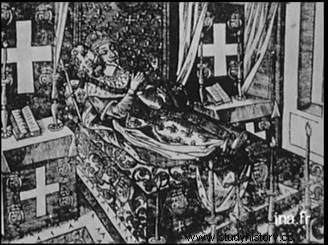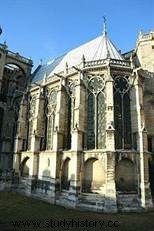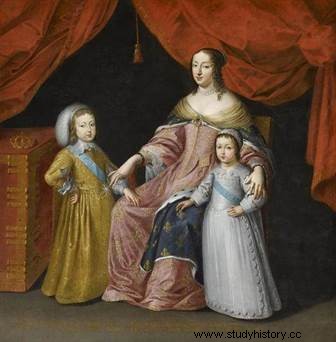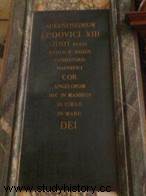 On the death of Louis XIII May 14, 1643, the traditional and famous formula "The King is dead, Long live the King is pronounced in front of the remains of the sovereign, carried away by Crohn's disease . But the king's last weeks were busy, as he had to think about his succession and baptize his heir. Already very ill, he went out for the last time on February 15, 1643 in Versailles, during a supper offered to his brother Gaston after their reconciliation. He then returned to Saint Germain, to the Château Vieux, to take to his bed on the 21st, he hardly ever got up.
On the death of Louis XIII May 14, 1643, the traditional and famous formula "The King is dead, Long live the King is pronounced in front of the remains of the sovereign, carried away by Crohn's disease . But the king's last weeks were busy, as he had to think about his succession and baptize his heir. Already very ill, he went out for the last time on February 15, 1643 in Versailles, during a supper offered to his brother Gaston after their reconciliation. He then returned to Saint Germain, to the Château Vieux, to take to his bed on the 21st, he hardly ever got up.
The question of the succession of Louis XIII
Cardinal Mazarin is there, trying to consolidate his position within the Council, in order to favor the accession of Anne of Austria to the Regency. The king meanwhile considered "the queen incapable of all her affairs and very passionate about her country, but he had little more inclination for Monsieur". Parties formed around her, led by the Bishop of Beauvais and Loménie de Brienne against Gaston's party. We must go as quickly as possible, time is running out...
The king makes a general confession on March 19 and then is transported to the Château Neuf, where the air is more breathable; on the 24th, he even resumed the sunrise ceremony, which had been suspended for the past few weeks due to serious illness. On April 3, Louis XIII wants to take a last walk through the corridors of the castle, supported on each side by Mr. Souver, First Gentleman of the Chamber and by Charost, Captain of the Bodyguards, Dubois the Valet follows with a chair. After a few steps, the king is forced to sit down, much too tired.
On April 20, Louis XIII officially gathers around him his wife, his brother, Henri de Condé, the dukes and peers, the members of the Council as well as the great officers of the kingdom . He has his decisions taken a few days before read out:Anne is Regent, but under guardianship; Gaston appointed lieutenant of the kingdom and president of the Council of Regency, Mazarin obtains power over the Church; the decisions of the Council of Regency will be taken by a majority of the seven members, the cardinal acting as arbiter.
The baptism of his heir
Remember that little Louis had only been rippled at birth. The king waiting for an answer from Pope Urban VIII, whom he wanted as his godfather, must now do without him, he must change his views, because he does not really feel very well.
 On April 21, the baptism took place in the gothic chapel of the Château Vieux. It is a short and simple ceremony due to the state of health of the king who, moreover, is absent. Little Louis is wearing a silver gauze dress, just worn over his ordinary clothes. The Bishop of Meaux officiates, in front of a large number of people from the royal family and the Court, accompanied by the godmother Charlotte de Montmorency, Princess of Condé, the last passion of Henri IV and the godfather, Cardinal Jules Mazarin. For this man, it is an incredible mark of honor because he "must serve as father to the child if his natural father disappears".
On April 21, the baptism took place in the gothic chapel of the Château Vieux. It is a short and simple ceremony due to the state of health of the king who, moreover, is absent. Little Louis is wearing a silver gauze dress, just worn over his ordinary clothes. The Bishop of Meaux officiates, in front of a large number of people from the royal family and the Court, accompanied by the godmother Charlotte de Montmorency, Princess of Condé, the last passion of Henri IV and the godfather, Cardinal Jules Mazarin. For this man, it is an incredible mark of honor because he "must serve as father to the child if his natural father disappears".
The child baptized Louis Dieudonné shows great seriousness. Then, accompanied by his godfather, he goes to his father to kiss him, who welcomes him to the queen's study, on the first floor of the Château Neuf. From his bed, he sees the towers of the Saint Denis basilica and says "this is where I will stay for a long time".
He awaits his end, the passing days interspersed with suffering and numerous visits, such as that of the Grande Mademoiselle or of Saint Vincent de Paul who both note the great piety of the king “the pious and generous sentiments of his soul gave edification; he spoke of death with a Christian resolution…during his illness, I heard that he had put to music the De Profundis which was sung in his death and he ordered with the same peace of mind what would be to do for the good of the administration of his kingdom when he was dead”.
On April 22, the king who is fainting summons the queen and her children for a final blessing. All three have a hard time moving forward, it's so crowded. After her second syncope the next day, extreme unction is administered to her in front of the whole family:Gaston, Condé and Anne who wishes to stay with her husband, but who does not know to whom to entrust her children. The overexcited atmosphere worrying the Marshal de La Meilleraye, he brings in additional guards; by ricochet, Gaston and Condé appeal to their supporters. Rumor has it that the royal children are going to be kidnapped on behalf of Gaston. Anne therefore entrusts their guard to the Duke of Beaufort, a royal bastard who cannot claim any place in the Regency system. With his weak mind, he has the castle surrounded by soldiers:soon there are only armed people and the clanking of weapons...
Fortunately the king comes to his senses and immediately approves of his wife for her child-protecting instinct. Better, he gets up the next day and dines in public. But from that day on, the queen settled in a room adjoining that of her husband, watching over him, taking care of the night guards and keeping the intruders away. Everything seems calm…
The death of Louis XIII
The king's days are numbered:he coughs more and more, is subject to severe diarrhea and numerous ulcers. Despite the unbearable smells, the queen remains, and shows great dignity. The sane king, always very lucid, is "happy" with Anne's presence, while continuing to curse his doctors "who have overwhelmed me with remedies that have ruined my health", because these people there wake him up with a loud bang to administer an ineffective pharmacopoeia, composed among other things of ferruginous water from Forges.
 On May 10, the king was at his worst "with his mouth open and his eyes wide open", as can be seen little Louis Dieudonné.
On May 10, the king was at his worst "with his mouth open and his eyes wide open", as can be seen little Louis Dieudonné.
On the 12th, he received extreme unction, Gaston was urgently recalled and in a burst of life, the king called his brother and his wife together, asking them to s hear always for the good of the children and that of the kingdom. Condé, called to the bedside of the king, thinks he is wandering when he tells him that he had foreseen the victory of his son in the armies. During the day, he dictates his personal will, bequeathing his heart to the house of the Jesuits, wishing no ceremony for his funeral, distributing alms to the poor and asking for masses for the repose of his soul.
On the 13th, the king spends his day with his confessor, becomes worried, questions him about the judgment of the soul, saying "thoughts come to me that torment me ". During this night, the king constantly asks what time it is.
On May 14, 1643, after mass, he called his doctor and inquired about his condition "I believe, Sire, that it will soon be that God will deliver Your Majesty from sorrows of this world”. No more noise is heard, despite the crowd that fills the room. The king blesses his wife and children one last time, he drinks a little milk one last time, recites the prayer for the dying and pronounces the name of "Jesus" for the last time:he dies at two-quarters past two. victim of Crohn's disease.
The King is dead, long live the King
The queen did not attend the last moments and learning of the death of her husband, has the impression that her heart is being torn out, she is seized with a deep sadness. She joins her son and kneels first in front of her new king, but takes care to evacuate all the courtiers who have come running:as a mother, she wants to take advantage of this moment, alone with Louis, her son!
 May 15, the Queen leaves for Paris, followed by a procession of carriages and carriages, carrying the furniture and the royal family, surrounded by the soldiers of the king's household, the musketeers, the Hundred Swiss and an empty carriage, that of Louis XIII, drawn by his six favorite horses. After seven hours, the convoy arrives at the Louvre.
May 15, the Queen leaves for Paris, followed by a procession of carriages and carriages, carrying the furniture and the royal family, surrounded by the soldiers of the king's household, the musketeers, the Hundred Swiss and an empty carriage, that of Louis XIII, drawn by his six favorite horses. After seven hours, the convoy arrives at the Louvre.
Meanwhile, there is only one guest left in Saint Germain:the king dressed in a camisole and wearing a nightcap, covered with a simple white sheet, without scepter or crown, watched over by a few officers. His body remains exposed for three days in the antechamber until the autopsy carried out on May 18 by eighteen doctors and surgeons who note a complete decay of the viscera. The diagnosis a posteriori of the doctors is a "purulent peritonitis by perforation of the colon, at the end of a severe inflammatory enterocolitis of the Crohn type".
On the 19th, after the embalming and the De Profundis early in the morning, the coffin was closed and placed on a large arms cart, covered with a "velvet stove black crossed with white satin”. The convoy arrives in Saint Denis around ten o'clock in the evening, Louis XIII will be placed between the graves of Henri IV and Marie de Médicis.
Bibliography
- Anne of Austria, by Claude Dulong. History folio, 1985.
- Louis XIII, by Jean Christian Petitfils. Perrin, 2008.
- For the Love of the Child King, by Alain Gilles Minella. Perrin 2008.
